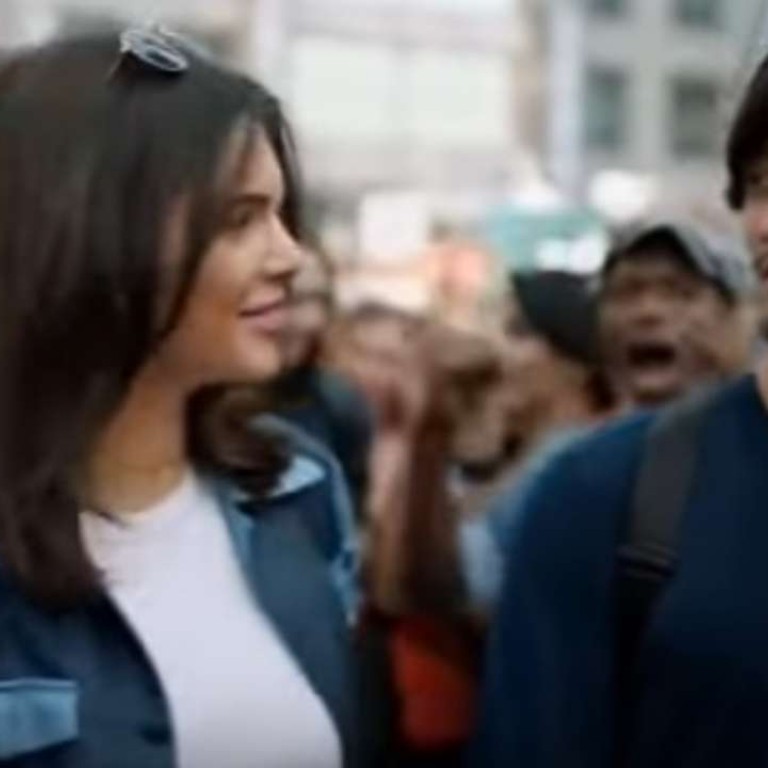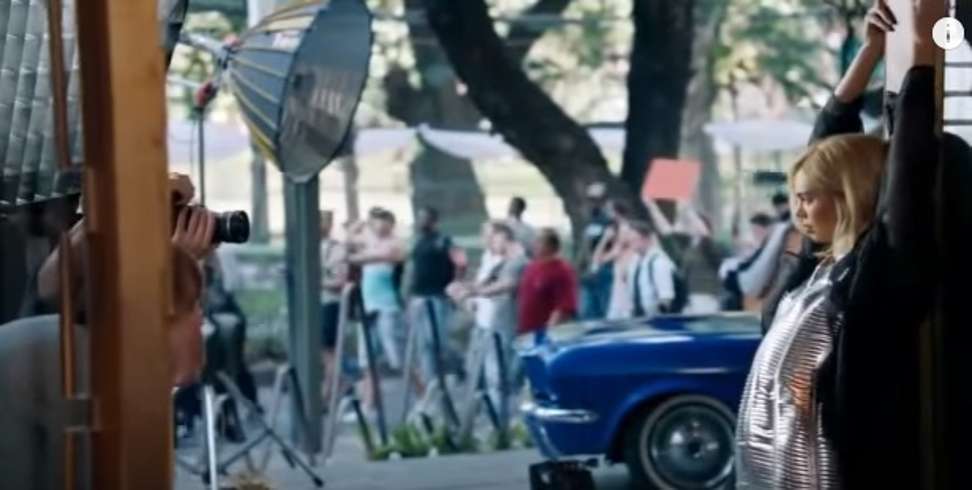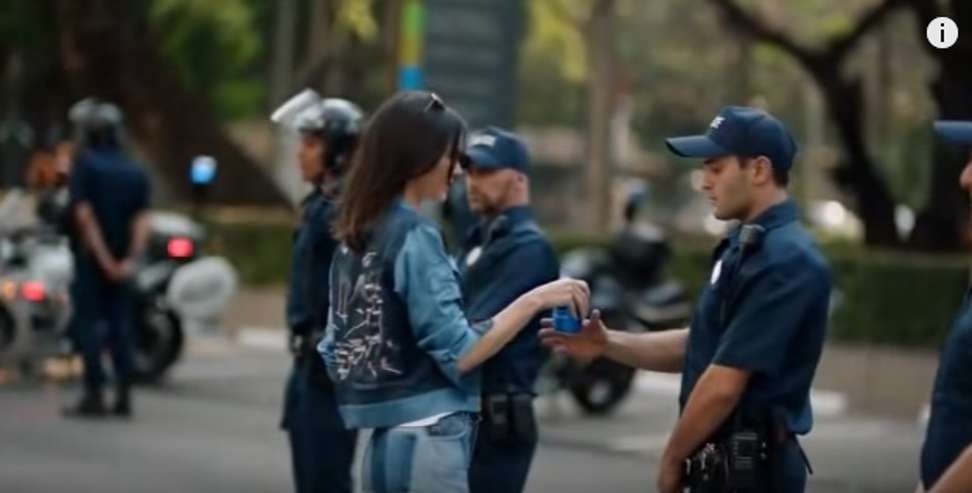
Pepsi pulls ‘stupefyingly diabolical’ ad depicting Kendall Jenner joining protest march
The spot features Jenner breaking from a modelling shoot to join the swelling ranks of a generic street march, where she defuses the tension by handing a Pepsi to a cute cop
Perhaps having celebrity model and reality TV star Kendall Jenner re-enact a seminal moment in the Black Lives Matter protest movement to sell Pepsi wasn’t such a good idea after all.
After initially defending its online video featuring Jenner and a can of soda as peacemakers in a street standoff between marchers and police, PepsiCo pulled the controversial spot amid widespread backlash.
Posted on Monday, the nearly three-minute “Live For Now Moments Anthem” video generated about 1.8 million views on Pepsi’s YouTube page, with about 29,000 dislikes and thousands of negative comments, before suddenly “going private” midday on Wednesday.
“Pepsi was trying to project a global message of unity, peace and understanding,” the company said Wednesday afternoon in a post on its website. “Clearly we missed the mark, and we apologise. We did not intend to make light of any serious issue. We are removing the content and halting any further roll-out. We also apologise for putting Kendall Jenner in this position.”
Created by Pepsi’s in-house ad agency, the sweeping spot features Jenner breaking from a modelling shoot, doffing a blonde wig and joining the swelling ranks of a generic street march, where she defuses the tension by handing a Pepsi to a cute cop.
The Twitterverse erupted with derision, outrage and threats to boycott the beverage company.
“They screwed up,” said New York-based branding strategist Peter Shankman. “It happens. Someone dropped the ball.”
Pepsi issued a statement on Tuesday that said the ad “reflects people from different walks of life coming together in a spirit of harmony, and we think that’s an important message to convey”.
The company described the creative effort on its YouTube page: “A short film about the moments when we decide to let go, choose to act, follow our passion and nothing holds us back. Capturing the spirit and actions of those people that jump into every moment and featuring multiple lives, stories and emotional connections that show passion, joy, unbound and uninhibited moments.
“No matter the occasion, big or small, these are the moments that make us feel alive.”
Pepsi was trying to project a global message of unity, peace and understanding. Clearly we missed the mark, and we apologise
Many posters had a different take, saying Pepsi was co-opting the Black Lives Matter movement and making light of issues that have mobilised political resistance in recent years.
The climactic moment of the Pepsi video evoked the now-viral photo of Ieshia Evans standing peacefully in front of police in riot gear last July in Baton Rouge, Louisiana, as marchers protested the fatal police shooting of Alton Sterling.
Evans, who is black, was arrested. In the Pepsi video, Jenner, who is white, enjoys a joyful bonding moment with the police officer.
“Live Bolder,” says Pepsi, at the end. Bold is certainly one way of putting it. The backlash was swift, furious and witty.
Charles Blow, a columnist for The New York Times, tweeted that he would boycott Pepsi products until the brand apologised for “this blasphemy”.
Cans and bottles of Pepsi were Photoshopped into key moments of the civil rights movement, and pictures of police brutality were captioned with: “Kendall, please! Give him a Pepsi!”
If there is one area in which the ad succeeded, it was in its ability to unite people across the political spectrum – even Piers Morgan called it “stupefyingly diabolical” and “snowflake claptrap”.

“It’s a unique skill to have #boycottpepsi trending among both the right and the left. It managed to alienate both sides of an increasingly polarised consumer universe,” said Nicola Kemp, trends editor at advertising trade magazine Campaign, who pointed out that the ad was made by an in-house team at Pepsi, which may be why there is a sense that nobody thought to point out its deficiencies before it aired.
Kemp argued that not only was the ad tone-deaf, it also failed to make any political point at all, co-opting the imagery, without taking a stand.
“You get a lot of people saying we’re in a state of perpetual outrage, that brands should always be aware that taking a stand can create a backlash, and that it’s better to stand for something than for nothing,” she said. “But in effect it did both: it stood for nothing, with these anodyne signs, and it still created a backlash.”
The message missed its mark widely with its target audience, said Tim Calkins, a marketing professor at Northwestern University’s Kellogg School of Management.

“There’s an issue with authenticity,” Calkins said. “The reason this one is getting people riled up is that it comes across as so inauthentic at a time when authenticity is so important, particularly for young people.”
Pepsi is not the first advertiser to produce a politically incorrect or widely loathed spot.
Notable disasters include Chicago-based Groupon’s 2011 Super Bowl ad, which started out as a pseudo-public service announcement about the endangered Tibetan people and ended with actor
Timothy Hutton sitting in a restaurant, extolling their ability to “still whip up an amazing fish curry”.
Backlash forced then-Groupon CEO Andrew Mason to apologise and remove the ad from circulation.
More recently, Pepsi rival Coke generated backlash with a 2014 Super Bowl ad featuring a melting pot of people singing America the Beautiful in different languages. That spawned a brief boycott campaign on Twitter and some very vocal critics, but the furore proved to be short-lived.

Also on Wednesday, German skin care company Nivea pulled a widely criticised social media ad that used the phrase “White is Purity” to promote deodorant.
Shankman, who called Pepsi’s commercial “horrible,” said there have been many misses in the history of advertising and that perhaps the posters venting on social media over the ad protest too much.
“In the grand scheme of things, it’s almost nice to have something like this to worry about in an era of [Donald] Trump,” Shankman said.
Calkins said the negative publicity generated by the Pepsi campaign will likely fade, but it may take some time.
“You want to get attention for the right reason, and I don’t think at Pepsi they’re thrilled with the feedback they’re getting right now,” he said.
Additional reporting by The Guardian

